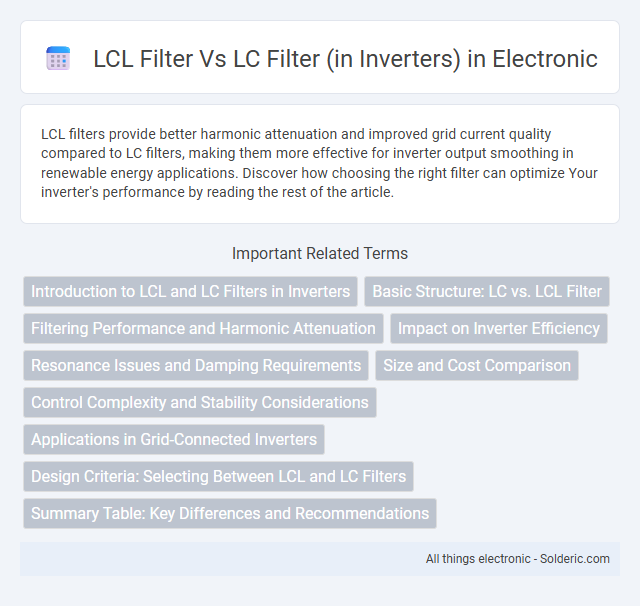LCL filters provide better harmonic attenuation and improved grid current quality compared to LC filters, making them more effective for inverter output smoothing in renewable energy applications. Discover how choosing the right filter can optimize Your inverter's performance by reading the rest of the article.
Comparison Table
| Feature | LCL Filter | LC Filter |
|---|---|---|
| Components | Two inductors + one capacitor | One inductor + one capacitor |
| Harmonic Attenuation | Higher attenuation, better harmonic filtering | Moderate attenuation, less effective filtering |
| Size | Compact due to smaller passive components | Bulkier inductors required |
| Cost | Typically higher due to extra inductor | Lower cost, fewer components |
| Resonance Damping | Easier to control resonance with added inductor | Harder to damp resonance effectively |
| Applications | High-power grid-tied inverters and renewable energy systems | Low to medium power inverters with less stringent filtering |
Introduction to LCL and LC Filters in Inverters
LCL filters consist of two inductors and a capacitor arranged to reduce harmonic currents and improve power quality in inverter output by attenuating switching frequency harmonics effectively. LC filters, composed of a single inductor and capacitor, provide basic harmonic suppression but have limited attenuation compared to LCL filters, especially at higher switching frequencies. The choice between LCL and LC filters impacts inverter efficiency, size, and overall system stability in renewable energy applications.
Basic Structure: LC vs. LCL Filter
An LC filter in inverters consists of a single inductor (L) followed by a capacitor (C), designed to smooth voltage and reduce high-frequency switching harmonics. In contrast, an LCL filter incorporates two inductors (L1 and L2) separated by a capacitor (C), offering enhanced attenuation of switching noise and improved harmonic suppression. The additional inductor in the LCL filter enables better filtering performance and reduced losses compared to the simpler LC filter structure.
Filtering Performance and Harmonic Attenuation
LCL filters provide superior filtering performance compared to LC filters by offering enhanced harmonic attenuation, especially in high-frequency ranges, which significantly reduces current ripple and electromagnetic interference in inverter applications. The additional inductance and capacitance stages in LCL filters enable better suppression of switching harmonics, improving power quality and system stability. Your inverter's output benefits from smoother sinusoidal waveforms with LCL filters, minimizing waveform distortion and extending the lifespan of connected equipment.
Impact on Inverter Efficiency
LCL filters in inverters reduce high-frequency harmonic currents more effectively than LC filters, resulting in lower switching losses and improved overall inverter efficiency. The additional inductance and capacitance in LCL filters provide better attenuation of grid-side harmonics, minimizing power losses and electromagnetic interference. Consequently, LCL filters optimize inverter performance by enabling more efficient power conversion with reduced thermal stress on components.
Resonance Issues and Damping Requirements
LCL filters in inverters exhibit lower resonance frequencies compared to LC filters, increasing the risk of harmonic amplification and instability in the power system. Effective damping strategies, such as passive resistive damping or active damping techniques, are essential to mitigate resonance peaks and ensure grid compliance. LC filters have higher resonance frequencies and simpler damping requirements but typically provide less harmonic attenuation than LCL filters.
Size and Cost Comparison
LCL filters typically require more components than LC filters, resulting in a larger physical size and higher cost. However, LCL filters offer better harmonic attenuation and improved performance in inverter applications, which may justify the additional expense for critical uses. Your choice depends on balancing budget constraints with the need for enhanced filtering efficiency and overall system size limits.
Control Complexity and Stability Considerations
LCL filters offer improved harmonic attenuation in inverters but introduce higher control complexity due to resonance issues requiring advanced damping strategies. LC filters provide simpler control implementation with inherent stability advantages but deliver less effective suppression of high-frequency switching harmonics. Selecting between LCL and LC filters involves balancing the desired harmonic performance against the controller design intricacies and system stability requirements.
Applications in Grid-Connected Inverters
LCL filters are preferred in grid-connected inverters for their superior harmonic attenuation and reduced switching ripple compared to traditional LC filters. The additional capacitor in an LCL filter enhances filtering efficiency, making it ideal for meeting stringent grid codes and reducing electromagnetic interference. LC filters, while simpler and cost-effective, are typically used in low-power applications due to their limited ability to suppress high-frequency harmonics in grid-connected systems.
Design Criteria: Selecting Between LCL and LC Filters
Design criteria for selecting between LCL and LC filters in inverters include harmonic attenuation requirements and size constraints. LCL filters offer superior high-frequency harmonic reduction due to the additional inductor and capacitor stage, making them ideal for stringent grid standards. LC filters are simpler and smaller, suitable for applications with moderate filtering needs and space limitations.
Summary Table: Key Differences and Recommendations
LCL filters offer enhanced harmonic attenuation compared to LC filters, making them ideal for inverter applications requiring stringent power quality standards. LC filters provide simpler design and lower cost but may fall short in filtering higher-order harmonics effectively. Your choice depends on the inverter's harmonic distortion levels, installation space, and cost constraints, with LCL filters recommended for high-performance needs and LC filters suitable for basic applications.
LCL filter vs LC filter (in inverters) Infographic

 solderic.com
solderic.com